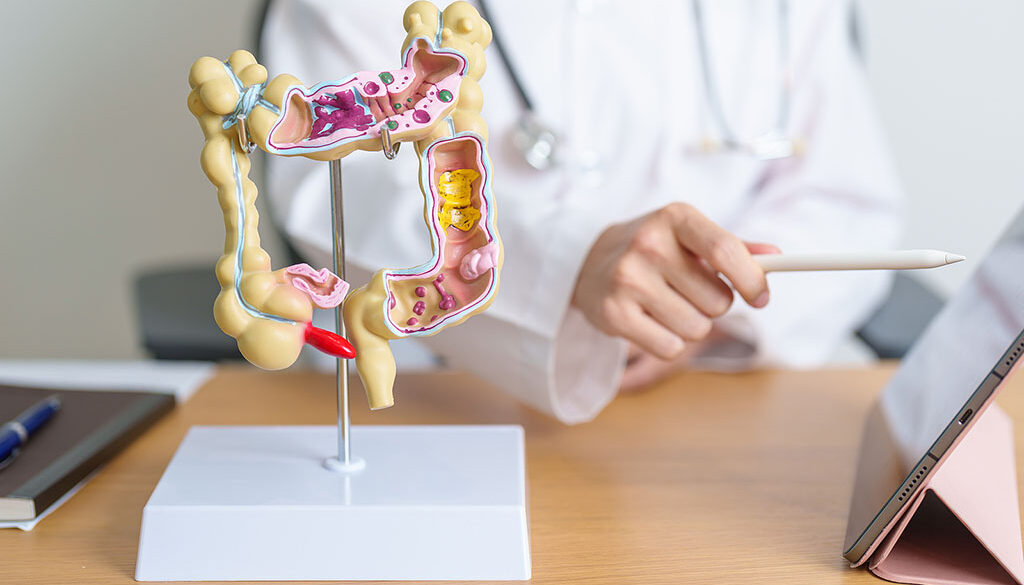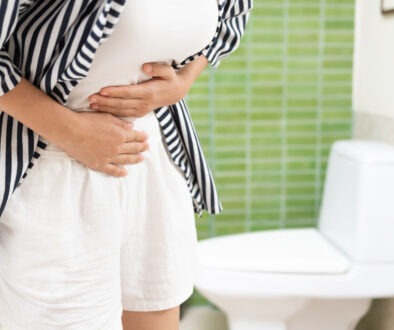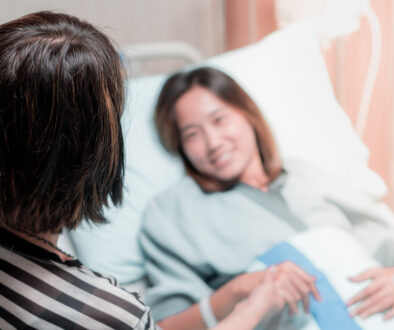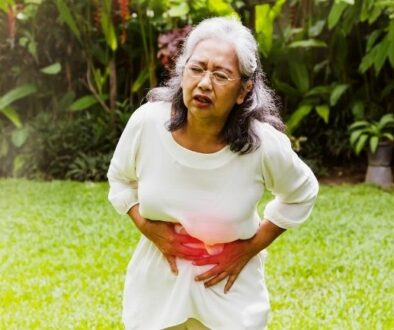Can Ulcerative Colitis Be Cured? We Explore Your Options
If you have ulcerative colitis, we don’t have to explain the pain and frustration of coping with chronic diarrhea and cramping. This inflammatory bowel disease causes ulcers in your colon, but is there a solution? Can ulcerative colitis be cured? We’ll explain the elements of this disease, effective treatments, and how our board-certified gastroenterologists can help.
Our philosophy centers around a team approach to medicine. We combine the best in compassionate care from board-certified gastroenterologists with evidence-based, state-of-the-art technology to provide the highest level of service for our patients. With five primary office locations through Johnston and Wake counties, RMG Gastroenterology is both convenient and cost-effective. We invite you to experience our dedication and expertise for yourself. Speak with your primary care provider for a referral.
Can Ulcerative Colitis Be Cured?
Unfortunately, there is no cure for ulcerative colitis. However, we can work with you to provide relief from the difficult and debilitating symptoms of the disease. We have successfully helped patients throughout the Triangle achieve long-term remission from ulcerative colitis.
Since ulcerative colitis can’t be cured, we’ll focus on how we assist our patients who have been diagnosed with this condition.
How Is Ulcerative Colitis Treated?
Your treatment plan will be tailored to your unique condition and medical history, but in general, the following are some effective treatments for ulcerative colitis we may prescribe:
Anti-inflammatory drugs
Typically, this is the first line of treatment we use for ulcerative colitis. Some of the medicines we may use include:
- Oral 5-aminosalicylates
- Corticosteroids
Immunomodulators
These suppress your immune system, and as a result, reduce symptoms. In certain cases, we may combine immunomodulators with certain anti-inflammatory drugs. Examples of immunomodulators include:
- Azathioprine
- Mercaptopurine
- Cyclosporine
Biologics
Biologics focus on the immune system proteins. Some biologics we may use include:
- Infliximab
- Vedolizumab
- Ustekinumab
- Mirikizumab
- Risankizumab
Small molecules
These types of medicines include:
- Upadacitinib
- Filgotnib
- Ozanimod
Will I Need Ulcerative Colitis Surgery?
Sometimes, medication is not enough to treat ulcerative colitis. In these cases, surgery may be needed. Roughly 20 to 30% of ulcerative colitis patients will require surgery.
Every patient is different, so we evaluate each situation on a case-by-case basis. However, you might need surgery if you have conditions such as uncontrollable sepsis, a condition that causes tissue damage and organ failure. Surgery may also be necessary if you have a colonic perforation (a hole in your colon) or severe bleeding.
How We Can Help You With Your Ulcerative Colitis Flare-Up
Living with ulcerative colitis is both challenging and exhausting. Avoiding flare-ups is vital to achieving a better quality of life. We can work with you to develop a strategy that you can implement in your everyday life.
We recommend:
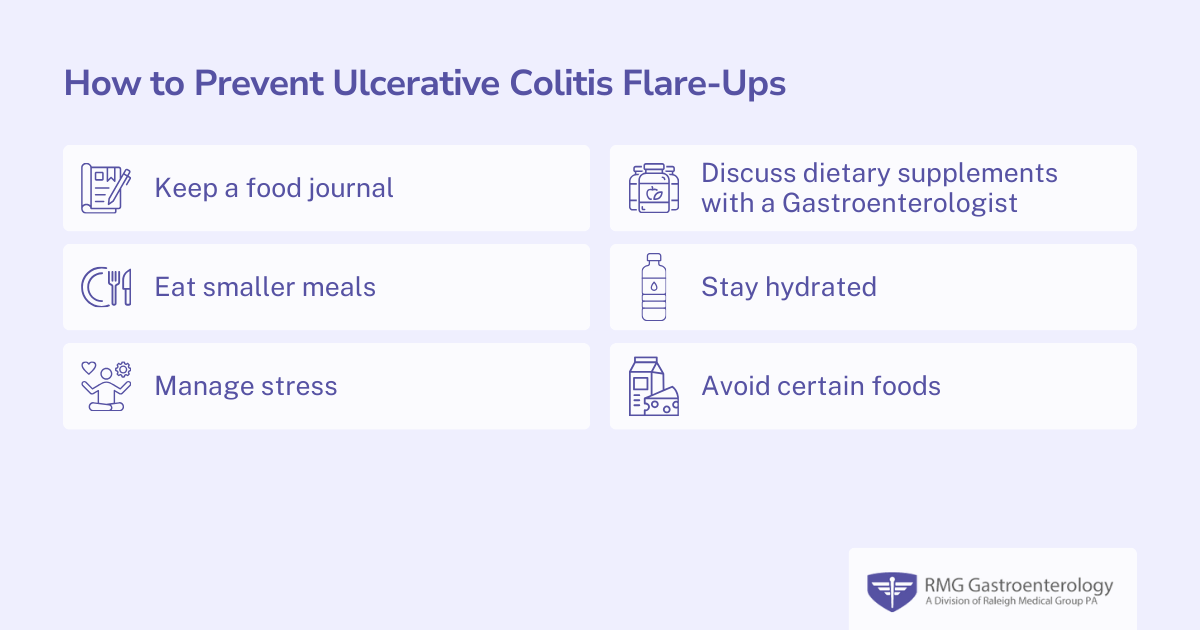
- Keeping a food journal: This will help you identify foods– like dairy –that can trigger an episode. We encourage you to bring your journal to your appointment and discuss it with us.
- Eating smaller meals: When we review your food journal, we’ll help you find ways to eat smaller meals, which can help you if you have an ulcerative colitis flare-up.
- Managing stress: We know that stress can play a role in your gastrointestinal health, and we encourage you to find healthy outlets to relieve anxiety, such as exercise, adequate sleep and even meditation.
- Discussing dietary supplements with us: First, do not take any herbal or dietary supplements without speaking to us. Many of these are not regulated, and they can interact with prescription or over-the-counter medicine. We’ll work with you to determine which ones may be appropriate.
- Staying hydrated: If you have frequent diarrhea associated with ulcerative colitis flare-ups, it’s easy to become dehydrated. We encourage you to drink water—be sure to avoid certain sports drinks that may be loaded with sugar.
- Avoiding the worst foods for ulcerative colitis: Sometimes, simply staying away from the worst foods for ulcerative colitis can make a huge difference; we can review this when we discuss your food journal with you. Some foods to avoid include:
- Dairy products
- Spicy foods
- Nuts, seeds
- Alcohol
- Raw fruits and vegetables (you don’t have to give up this food group completely, just avoid them in the raw form.)
We Work With You to Minimize the Effects of Ulcerative Colitis
While ulcerative colitis can’t be cured, working with our team of board-certified gastroenterologists in Raleigh can minimize the effects of the disease. Our personalized, compassionate care will improve your quality of life. With several locations, we offer care that is both personalized and convenient.
If left untreated, ulcerative colitis can develop into more serious health issues. Therefore, if you’re struggling with this illness, we urge you to request an appointment today.
The content within this article and others on this website is only for educational purposes and should not be considered as medical advice. For any questions or concerns, please consult with your healthcare provider.
=====
Sources:
DeLeon MF, Stocchi L. Elective and Emergent Surgery in the Ulcerative Colitis Patient. Clin Colon Rectal Surg. 2022 Nov 29;35(6):437-444. https://pmc.ncbi.nlm.nih.gov/articles/PMC9797282/#sec1
Gros B, Kaplan GG. Ulcerative Colitis in Adults: A Review. JAMA. 2023;330(10):951–965. doi:10.1001/jama.2023.15389 https://jamanetwork.com/journals/jama/article-abstract/2809412
Mayo Clinic, “Ulcerative Colitis Flare-Ups: 5 Tips to Manage Them,” https://www.mayoclinic.org/diseases-conditions/ulcerative-colitis/in-depth/ulcerative-colitis-flare-up/art-20120410
Mayo Clinic, “Ulcerative Colitis,” https://www.mayoclinic.org/diseases-conditions/ulcerative-colitis/diagnosis-treatment/drc-20353331

